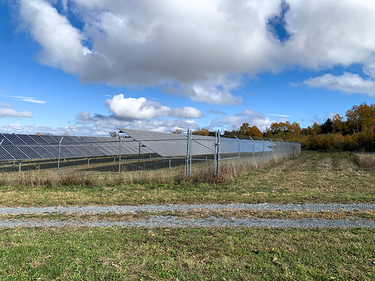Knox mulls extending solar moratorium to update master plan
— Photo from David Whipple
The Whipple property in Knox is the site of the town’s first commercial solar farm, constructed about six years ago on what used to be hayfields. The Knox Town Board placed a one-year moratorium on commercial solar projects last April so that the planning board can focus on its current solar workload, and will soon consider a six-month extension.
KNOX — As the clock runs out on its current solar moratorium, the town of Knox will consider a six-month extension at its next board meeting on Feb. 13.
The town had voted unanimously to adopt a year-long moratorium in April of last year as it juggled three projects, all in different phases.
One project, from developer RIC, had been approved for construction on Thompsons Lake Road prior to the moratorium. A second proposal from RIC — also sited on Thompsons Lake Road — was rejected by the town planning board after it had adopted the moratorium, due to strong community opposition.
The third project, from Green Leaf Energy, is sited on the 303-acre Reservoir Road property owned by the village of Altamont and is currently under consideration by the Knox Planning Board.
Unlike the community view of RIC’s rejected proposal, the Green Leaf Energy project is expected to have minimal impact on neighboring properties.
The only other commercial solar project in town - besides the town’s own facility at the old landfill property, which went online in October - er - was built in 2016 on 14 acres owned by David Whipple just south of Old Stage Road, a short distance from its intersection with Route 156, to supply power to the SUNY Polytechnic campus in Guilderland and Albany.
“The planning board really needs to get kind of caught up on the current laws and situations that exist …,” Supervisor Russ Pokorny told The Enterprise when the moratorium was first adopted. “I don’t know how they could process any more than they have in the pipe right now.”
The influx of solar projects in Knox was similar — though less extreme — to one seen in Westerlo prior to that town adopting its own year-long moratorium in 2019, which was extended by another year.
Although Knox is not expected to overhaul its solar law as drastically as Westerlo did during its two-year break from solar, the town is reviewing the current zoning and considering updates.
Planning board Chairwoman Deb Nelson said at the board’s September meeting that the town would need an update to its comprehensive plan — something that Pokorny said he agreed with in a campaign interview with The Enterprise last year, while noting that the current plan had a strong foundation.
The comprehensive plan, Knox’s first, was adopted in 1994 and last updated in 2015, but Nelson suggested that it is an inadequate measure of residents’ attitudes toward solar, and that an update should be carried out with the help of a consultant to minimize political influence.
The planning board has looked at model solar laws from New Scotland, Lewis County, Dutchess County, and the town of Canton, as well as more general reference materials compiled by organizations like American Farmland Trust and the Tug Hill Commission, among others.
Pokorny said this week that he personally is in favor of extending the moratorium, since it’ll give the planning board the time it needs to craft sufficient guidance.
“My understanding is, if you do a six-month extension, and then you manage to write the [solar] law and want to enact it, then the moratorium can come to an end at that point, before the six months is up,” he said. “It just gives you time to get the law written correctly.”


